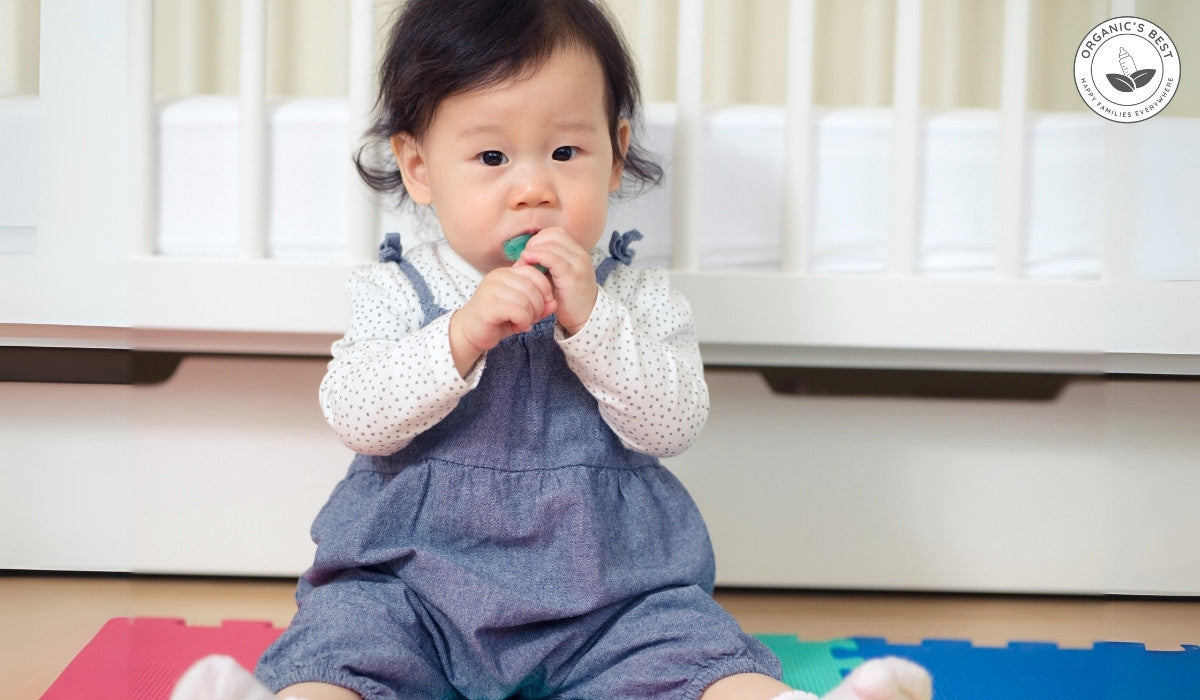Click to Get 2 FREE Boxes/Cans
Click to Get 2 FREE Boxes/Cans
Only New Customers! Click HERE to Get 2 Extra Boxes/Cans for Free With Your First Order.
Only New Customers! Click HERE to Get 2 Extra Boxes/Cans for Free With Your First Order.
BABY FORMULA
Offering new parents top-quality European infant formula from renowned brands like HiPP, Holle, Kendamil, and more. If you’re uncertain about which product to choose, our Formula Finder can help you make the best decision for your baby.
Baby Food
Offering new parents a premium selection of European baby foods, including jars, pouches, cereals, and snacks from esteemed brands like HiPP and Holle.
When Do Babies Start Teething? Baby Teeth Chart Included
by Agustina Fernandez November 19, 2024 8 min read

Ah, teething, one of the many rites of passage every parent endures. Your little one is experiencing their first taste of "growing pains," and you're right there by their side, helping ease the discomfort through every tear and wince, knowing that soon that gummy grin will be replaced with a full set of pearly whites.
While you may not have been warned about the countless hours of soothing, wiping drool, and consoling, you're here now-and we've got the lowdown on everything you need to know to manage this with ease.
From toothy timelines to common symptoms and sanity-saving remedies, we're here to help you through this stage with a smile.
Table of Contents
Baby Teeth Chart: Order of Teeth Eruption
Parents often look forward to that first little tooth emerging, marking an important milestone in their baby's life. If you're anxious for that first tooth to come through, you may be asking yourself, when do babies get teeth?
Well, if you notice that your baby seems to be a bit more irritable than usual, their appetite has decreased, or you spot other baby teething signs, it could mean that teething is on the horizon.
So, when do babies start teething? While the timeline varies for every baby, those pearly whites will likely start to push through the gums at around six months. However, there are no strict rules, and sometimes, the first tooth comes in slightly earlier or later than expected.
Let's look at what order do baby teeth come in, so you know what to expect throughout this journey. Remember, it's a loose schedule-so don't sweat it if your tiny tot's teeth are on a timeline of their own.
-
Central Incisors: These are the "two front teeth" and typically the first teeth to make an appearance. They usually make their debut on the bottom first, around 6-10 months. Top central incisors often follow at 8-12 months.
-
Lateral Incisors: Next up are the lateral incisors, which are the teeth to either side of the central incisors. Expect these top ones to show up at 9-13 months, with the bottom ones arriving around 10-16 months.
-
First Molars: It's time to chew! The first molars, which sit a bit further back, emerge on top at 13-19 months and on the bottom at 14-18 months.
-
Second Molars: These molars come in last, with the bottom molars around 23-31 months and the top around 25-33 months.
Here is a baby teething chart that you can use as a visual reference for when to expect each set of teeth to come in.

If you have any concerns surrounding your baby's teeth, we recommend contacting a trusted healthcare practitioner for personalized guidance.
Teething Symptoms: Signs of Teething in Babies
When your baby's teeth start coming through, it may cause them to act entirely differently, which can be alarming for parents if you don't know what to expect.
If you suspect that the first tooth will be appearing soon, it can be helpful to familiarize yourself with common baby teething symptoms.
While baby teeth coming in can affect each infant differently, some telltale signs of teething include:

-
Irritability: Getting baby teeth can make even the happiest babies cranky. If they seem more upset than usual, teething might be the culprit.
-
Refusal to Eat: Anything that touches those tender gums may be off the menu. Some babies refuse solid foods or even breast milk during peak teething pain.
-
Excessive Drooling: Teething and drooling go hand in hand. Get ready to change outfits, or just keep that bib on them 24/7!
-
Swollen, Red Gums: As teeth start to push through, those little gums might look a bit puffy or red. This is totally normal and a sign that a tooth eruption is on the way.
-
Mild Fever: Teething may cause a slight increase in body temperature (below 102°F). However, a true fever (over 100.4°F or 38°C) should prompt you to consider other causes as temperatures above this point usually aren't teething-related, which might mean it's time to check in with your doctor.
Teething Remedies: How to Help Teething Baby?
Now that you know the signs of teething, let's discuss what to do about them as we explore ways to manage the discomfort associated with your baby's teeth coming through.
Here are some tried-and-true teething remedies for babies:
Baby Teething Toys
The right teething toys can be a godsend during this challenging phase, and there are a couple of different types to choose from.
No matter what kind you choose, look for ones made from safe materials like rubber or silicone-just make sure they're free of harmful chemicals.
You can even pop them in the fridge for a little cooling relief or use them at room temp. Either way, they can bring some much-needed comfort to your baby while they're going through this.
Baby Teething Necklace
Teething necklaces are popular for parents looking for easy, on-the-go solutions to teething. These necklaces are made with smooth, chewable beads that can help soothe your baby's sore gums while keeping them engaged.
Baby Teething Ring
Teething rings are a staple in most baby's teething toolkits. These rings are designed to be soft enough for babies to bite but durable enough to withstand their little teeth.
Many teething rings come in fun shapes and colours, and some feature textured surfaces to help massage and relieve gum pain when baby is teething.
Baby Teething Gel
Teething gels can offer some relief through a mild numbing effect, but be cautious about the ingredients. Some gels contain ingredients that are not suitable for infants. It is best to talk to your pediatrician before using one, and always use it sparingly.
Baby Teething Biscuits

If your baby has reached the appropriate age (6-10 months, depending on the product), teething biscuits can be both soothing and tasty. Try organic, baby-safe options like Holle's Snack Little Farm Spelt Biscuits. Not only do they offer a wholesome crunch, but they're made with ingredients you can feel good about.
Holle's line also includes other options, like their Organic Spelt Baby Rusks or Organic Spelt Biscuits. All of these treats are free from added sugars and are perfect for on-the-go eating. Just ensure they are suitable for your baby's age before serving.
Baby Teething Food
Soft fruits like chilled melon can be tasty, soothing treats for babies comfortable with solids. The cool temperature provides relief, and the soft flesh is gentle on their tender gums.
However, if your little one struggles with solids during teething, try offering simple foods that they do not have to chew, such as plain yogurt, pureed meat, or mashed veggies and fruit.
Pacifiers
A chilled pacifier can do wonders for soothing a teething baby. Pop it in the fridge for a few minutes to cool it down, and then let your baby enjoy the comfort.
Gum Massage
A very common tip on how to soothe teething baby is to massage their gums. Using your fingertip to apply slight pressure on their gums can work wonders for relief.
Cold Washcloth
A chilled washcloth is one of the simplest, most effective teething remedies around. Grab a clean, wet washcloth to be used exclusively for your baby, place it in the fridge, and give it to your baby to chew on after chilling it for a few minutes. The cool temperature helps numb sore gums, and the soft fabric is easy on delicate mouths.
Breastfeeding
Breastfeeding can offer a special kind of comfort for teething babies. The warmth and closeness provide more than physical relief; it's a familiar source of love and reassurance that helps soothe their little hearts (and gums) during the teething journey.
Caring for Baby's First Tooth
Once that first tooth breaks through, it's time to kickstart a gentle oral hygiene routine.
Here's how to keep those new pearly whites in tip-top shape:

-
Start Brushing Right Away: Once you see that first tooth, introduce a gentle brushing routine. Use a soft-bristled, infant-friendly toothbrush with a tiny smear of fluoride toothpaste.
-
Brush Twice Daily: Get your baby used to brushing as part of their morning and bedtime routines. Even if it's just one tooth, a consistent habit now will lay the foundation for a healthy smile later.
-
Be Gentle and Thorough: Gently brush all surfaces of the tooth, taking care not to hurt those sensitive gums. This isn't just about cleaning but also teaching your little one that brushing can be a comforting ritual. Healthy habits now set the stage for a bright smile in the future.
When to See Your Baby's Healthcare Provider
Most teething symptoms can be managed at home, but there are times when it's best to consult your pediatrician.
Contact them if you notice any of the following:
-
High Fever: If your baby's temperature exceeds 102°F, this likely isn't teething. A pediatrician can help check for any underlying illness.
-
Persistent Irritability: Get professional guidance if your baby seems especially distressed and nothing seems to help.
-
Diarrhea or Vomiting: While mild changes in stool are normal, significant diarrhea or vomiting isn't usually teething-related. Check-in with your doctor to be safe.
Remember, it's always okay to ask for help! Your healthcare provider is there to ensure that you and your baby feel supported through every stage.
FAQs on Infant Teething
Let's tackle some frequently asked questions that arise when a baby is teething so that you are fully prepared when those first teeth come along.
How Long Does it Take for a Baby Tooth to Fully Grow In?
Usually, it takes a few days to a couple of weeks for a tooth to break through and become fully visible, with the average being around 8 days. The discomfort often starts before you even see the tooth poking out, and it can last for a little while afterward.
Does Teething Cause Fever?
Teething can cause a low-grade fever (below 102°F), but if your baby's temperature is higher, it might be due to something else.
Does Teething Cause Diarrhea?
While teething doesn't directly cause diarrhea, the extra drool can affect the digestive system and cause a bit of loose stool. But if it's severe or prolonged, check with your doctor.
Does Teething Cause Constipation?
No, teething isn't typically linked with constipation. If your little one is having trouble in the poop department, it's best to talk to your pediatrician.
Do Babies Cough When Teething?
Sometimes, yes. All that drool can cause mild coughing or gagging. But if the cough persists or is severe, it could be due to a cold or another illness.
Does Teething Hurt Babies?
Yes, unfortunately, it can be uncomfortable! The pressure of the new teeth pushing through tender gums can be unpleasant, but with a little help from remedies, you can provide some relief.
Do Babies Bleed When Teething?
Sometimes, you might notice a tiny bit of bleeding in the gums. It's usually nothing to worry about, but if you see significant bleeding, check with your doctor.
Does Teething Cause Sleepiness?
Yes, teething can wear them out, as their tiny bodies work hard to manage the discomfort and support this developmental milestone. Some babies may nap more often or longer, though others might have a tougher time sleeping.
Conclusion: Teething in Babies
Now you know the answer to the question, "When do babies start teething?" With this knowledge, you can prepare for what's to come, knowing how to spot the signs and manage discomfort.
While teething can be a challenging phase, the good news is it doesn't last forever. When things get tough, remember you're not alone-there are countless parents out there rubbing sore gums, wiping drool, and daydreaming of sleep right alongside you.
Rely on your support system when necessary and if you ever have concerns about your baby's teething, your pediatrician is always there to help.
|
Disclaimer: Please be aware that this information is based on general trends in babies, and it is not medical advice. Your doctor should be your first source of information and advice when considering any changes to your child’s formula and when choosing your child’s formula. Always consult your pediatrician before making any decisions about your child’s diet or if you notice any changes in your child. Breastfeeding is the best nutrition for your baby because breast milk provides your child with all the essential nutrients they need for growth and development. Please consult your pediatrician if your child requires supplemental feeding. |
Agustina Fernandez
Dr. Agustina Fernandez earned her medical degree from the prestigious Universidad Nacional de Córdoba, Argentina. With a deep-rooted passion for pediatrics, Dr. Fernandez is currently on the path to specializing in children's healthcare. Recently, she has delved into the vital field of infant nutrition. Her research interests include breastfeeding, infant formula, and baby food in little ones’ formative years. Dr. Fernandez's commitment to this area of study underscores her dedication to ensuring the health and well-being of children from their earliest days.
Leave a comment
Comments will be approved before showing up.
Also in Organic Infant Nutrition and Health Blog

10 Winter Activities for Kids and Toddlers
by Agustina Fernandez January 06, 2026 8 min read
Read More
How to Choose The Best Infant Formula: A Guide to EU Organic Formulas
by Agustina Fernandez January 05, 2026 14 min read
Read More
Best Formula for Breastfed Babies 2026 Guide
by Agustina Fernandez January 05, 2026 15 min read
Read More
Reviewed by Dr. Bardha Citaku, MD
-

Dr. Bardha Citaku: Medical Reviewer of Organic's Best Blog
Dr. Bardha Citaku completed her medical studies at the University of Prishtina in Kosovo, where she began her journey into the field of medicine. She has since developed a career in medical research, contributing to projects with notable organizations, including the World Health Organization (WHO).
